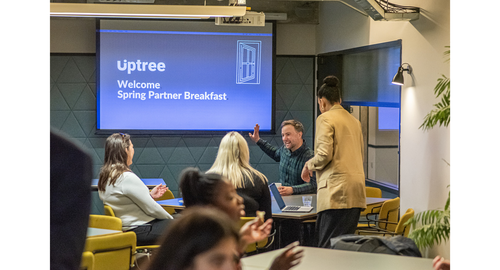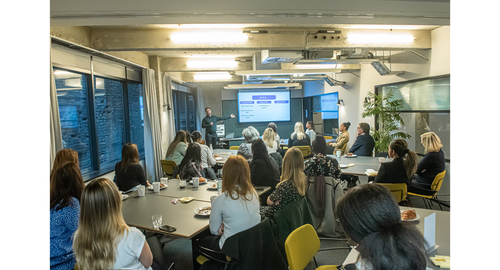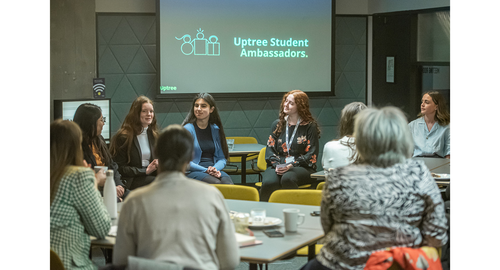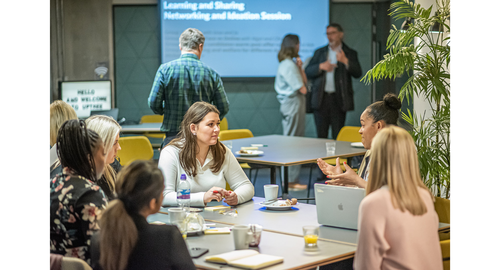
Spring Partners' Breakfast: Our key learnings
At Uptree, we aim to lead the conversation when it comes to diversity and inclusion in the early careers space and want to build a community where we can learn and grow as one. Our Partner Breakfasts are always an amazing opportunity for the different organisations we work with to come together and share ideas and thoughts.
Our Spring Partners’ Breakfast, held in March 2022, was no different. We took the opportunity to focus on key issues affecting young people, with involvement from our very own student ambassadors to provide deeper insights.
In this blog, we explore key takeaways from the day.

The importance of well-being and mental health
We were delighted to involve amazing speaker, Steve Keith, also known as The Branding Man as our keynote speaker. Steve is a longstanding friend of Uptree and we’re been proud to support his work as a sponsor of the Queer Student Awards (QSA) for a second year running. Founded by Steve in 2021, the QSA is a way to celebrate and recognise the talent of LGBTQ+ students. When he’s not organising the QSA, Steve runs his own business The Branding Man where he works with employers and educators to create brand campaigns that appeal to younger audiences.
During his keynote speech, Steve was keen to draw attention to mental health and the difference between wellbeing as outlined below:
Wellbeing: Feeling good and functioning well. This is a broad measure of a sense of self.
Mental health: A state in which the individual realises their own abilities, can cope with the normal stresses of life, can work productively and fruitfully and is able to make contributions to their own community This is a recognised condition.

Steve’s talk highlighted the spectrum of mental health and the different stages that people go through when tackling mental ill-health. Some key points to note when discussing mental health and wellbeing in young people are:
- There has been a decrease in the overall wellbeing of young people over the last 12 years
- 47% feel they have no control in their lives
- 66% feel more stressed, with over 50% feeling more anxious and fearing failure
Some of the causing factors of these stats are the following:
- Life after COVID-19 - 48% of young people are experiencing mental health conditions from being in lockdown. 69% feel their life is on hold and 32% are overwhelmed daily.
- Career fears - 73% of young people are frustrated over the future and 48% consider the impact on their mental health before accepting a job.
- Young women - their overall wellbeing is at its lowest point in the past 12 years, being 9% lower than young men. They also experience fears of failure in their career, 6% more than young men.
To help combat these issues, Steve suggests that employers aim to BUILD!
- Build better connections with young people - introduce a more inclusive onboarding process, utilising more blue and green spaces and make the most of nature.
- Build resilience by identifying triggers and coping mechanisms and also partnering with your learning and development team
- Build confidence - use safe spaces to reframe failure, focus on people, not perks and showcase supporting job postings.
What young people want
At Uptree we have a strong student network and in order to appeal to our students in the best way possible, we use focus groups and advice from our ambassadors on how we should move forward as an organisation. It was great to involve some of our student ambassadors in discussions around what young people look for when it comes to employers.

Here are some of the key take-homes and responses from our student ambassadors:
- When thinking about career events, there should be a clear distinction between webinars and online work experience. Employers need to consider making work experience events as interactive as possible. Students attend work experience to participate.
- Group sizes should be considered by employers when running sessions to avoid intimidating students who aren’t familiar with these interactions of this kind. Keeping numbers to around 30, with the option of introducing smaller breakout rooms, provides opportunity for students to get involved in a less daunting environment.
- When thinking about apprenticeships, there’s still a bias towards university, due to a lack of information around what apprenticeships have to offer. More needs to be done to increase awareness in schools about other employment routes, such as communicating with parents.
- Students care about diversity and inclusion within a business, with this often factoring into career choices. Young people are placing a lot of value on their overall mental health and wellbeing, with many feeling they should receive the necessary support in their working life.
Sharing best practices
During the event, our employer partners had the opportunity to collaborate with others on different topics including, keeping candidates warm after receiving an offer, equity in the workplace and wellbeing. There was an opportunity for attendees to consider the challenges and solutions around these topics. Notable takeaways from these sessions were:
Keeping candidates warm after offer
Challenges include:
- Some company processes take too long due to internal issues which can then lead to candidates losing interest or getting bored
- Assessment centres can also put candidates off due to the pressure and make them too anxious to apply.
Solutions to these challenges could include:
- Introducing bi-weekly calls with candidates to check-in can lead to organic conversations and make them feel at ease.
- Connecting them with their future line manager to establish a relationship before they start working can also help
- Providing information about assessment centres can help them prepare in advance.
Equity
Equity within the workplace refers to adapting ways of working to support individuals with different lived experiences.
Challenge includes:
- Whilst some companies offer incentives like flexible working to support working parents and mental health, companies should consider how they can make deeper changes in their business to improve equity.
Solutions to this challenge could be:
- Changes at board level within an organisation could be vital to improving equity so creating a diverse workforce would support gradual change at the top.

Wellbeing and welfare
Earlier we looked at what wellbeing is and defined this as “feeling good and functioning well”. Often, employers can assume that perks such as pool tables or after-work drinks are enough but the next generation are looking for more.
Challenges faced by companies include:
- Supporting new talent from different backgrounds and demographics.
- Creating an environment where minority ethnic employees are supported and comfortable in raising issues.
- Supporting younger staff to have two-way conversations with senior staff.
Solutions to these challenges could include:
- Training for people managers to really understand what wellbeing is and how to support team members.
- Listening to new hires on issues that might be affecting them, as well as reducing barriers for minority staff who may not feel otherwise comfortable in voicing their opinions.
Dates for your Diary
We look forward to our Employer Summer Networking event on 13 July for further insights and discussions.
Another key date to look forward to in the Uptree calendar is our FuturesUP event in July, our multi-industry networking event where 400+ students attend and have access to leading employers.
If you’re not a partner, but would love to be involved in future events then please reach out and let us know at learnmore@uptree.co.
By Uptree
Published on:
Thu 14 Apr 2022